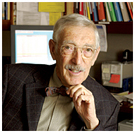|
||||||||
| | Members RSVP | Apply to become a member | Home | | ||||||||
| DATE : | Aug. 18th, 2011 @ 4PM | ABSTRACT: | The two major preventable risks for health are smoking and poor diets. These are lifestyle risks, which can be changed. Smoking shortens the lifespan by about 8 years on average (2 packs/day), and a poor diet is likely to have even a more significant negative impact on lifespan. A “balanced” diet is important for minimizing the diseases of aging; understanding balance could benefit almost all of us. Dr. Ames will discuss how, through his work and that of others, nutrition is now being put on a firmer scientific foundation than ever before. This understanding will lead to medicine that is more prevention-oriented for age-related diseases, and to inexpensive nutritional and other interventions to delay the degenerative diseases accompanying aging, such as cancer, cardiovascular disease, cognitive decline, stroke, and immune dysfunction. |
|||||
| VENUE : | Nixon Peabody -2 Palo Alto Square 3000 El Camino | |||||||
PROGRAM : |
|
|||||||
| SPEAKER BIOGRAPHY | ||||||||
|
||||||||
| | Members RSVP | Apply to become a member | | ||||||||
| Sponsors |
||||||||
 Bruce Nathan Ames (born December 16, 1928) is an American biochemist. He is a professor of Biochemistry and Molecular Biology at the University of California, Berkeley, and a senior scientist at Children's Hospital Oakland Research Institute (CHORI). He is the inventor of the Ames test, a system for easily and cheaply testing the mutagenicity of compounds. Ames was elected a Fellow of the American Academy of Arts and Sciences in 1970. He is a recipient of the Bolton S. Corson Medal in 1980, Tyler Prize for Environmental Achievement in 1985, the Japan Prize in 1997, the National Medal of Science in 1998 and the Thomas Hunt Morgan Medal in 2004,[2] among many others. His research focuses on cancer and aging and he has authored over 500 scientific publications. He is among the few hundred most-cited scientists in all fields. Ames' current research includes identifying agents that delay the mitochondrial decay of aging, understanding the role of mitochondrial decay in aging, particularly in the brain, optimizing micronutrient intakes in the population to prevent disease, malnutrition, and obesity.
Bruce Nathan Ames (born December 16, 1928) is an American biochemist. He is a professor of Biochemistry and Molecular Biology at the University of California, Berkeley, and a senior scientist at Children's Hospital Oakland Research Institute (CHORI). He is the inventor of the Ames test, a system for easily and cheaply testing the mutagenicity of compounds. Ames was elected a Fellow of the American Academy of Arts and Sciences in 1970. He is a recipient of the Bolton S. Corson Medal in 1980, Tyler Prize for Environmental Achievement in 1985, the Japan Prize in 1997, the National Medal of Science in 1998 and the Thomas Hunt Morgan Medal in 2004,[2] among many others. His research focuses on cancer and aging and he has authored over 500 scientific publications. He is among the few hundred most-cited scientists in all fields. Ames' current research includes identifying agents that delay the mitochondrial decay of aging, understanding the role of mitochondrial decay in aging, particularly in the brain, optimizing micronutrient intakes in the population to prevent disease, malnutrition, and obesity.